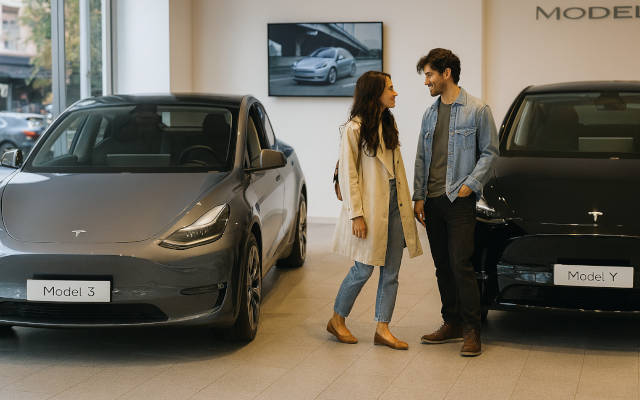 EDITOR'S PICK
EDITOR'S PICK
Hear Me Out: Instead of Faster Chargers, We Should Lobby for Slower Gas Pumps
12 Oct 2025 | Synopsis
 Tongue-in-cheek article argues that instead of demanding faster EV chargers, we should slow down gas pumps to equalize refueling times, while reducing evaporative emissions. It highlights how EV charging is often criticized for being slower than gas refueling, but reframes the issue by suggesting that slowing gas pumps would make EVs seem just as convenient if not more so. The piece uses satire to challenge perceptions and promote EV adoption.
Tongue-in-cheek article argues that instead of demanding faster EV chargers, we should slow down gas pumps to equalize refueling times, while reducing evaporative emissions. It highlights how EV charging is often criticized for being slower than gas refueling, but reframes the issue by suggesting that slowing gas pumps would make EVs seem just as convenient if not more so. The piece uses satire to challenge perceptions and promote EV adoption.The Worrisome Trend of the eVTOL Business Model
12 Oct 2025 | Synopsis
 eVTOL aircraft face serious business viability issues. GlobeAir's CEO stated there's "no business case" for wide-scale adoption after a failed Lilium partnership. The main problem: battery technology and lack of charging infrastructure at airports make operations economically unviable with "insane" hourly battery replacement costs. Aviation is already a low-margin business, and experimental technology faces high insurance costs.
eVTOL aircraft face serious business viability issues. GlobeAir's CEO stated there's "no business case" for wide-scale adoption after a failed Lilium partnership. The main problem: battery technology and lack of charging infrastructure at airports make operations economically unviable with "insane" hourly battery replacement costs. Aviation is already a low-margin business, and experimental technology faces high insurance costs. Auto Giant Stellantis Unveils Revolutionary Battery System Unlocking New EV Era
09 Oct 2025 | Synopsis
 Stellantis unveiled its Intelligent Battery Integrated System (IBIS), merging inverter and charger into the battery for a lighter, more efficient EV powertrain. IBIS boosts energy efficiency by 10%, power output by 15%, and cuts charging time by 15%. Tested in a Peugeot E-3008, it saves weight and space, simplifies maintenance, and eases reuse for energy storage. Stellantis aims for integration by 2030.
Stellantis unveiled its Intelligent Battery Integrated System (IBIS), merging inverter and charger into the battery for a lighter, more efficient EV powertrain. IBIS boosts energy efficiency by 10%, power output by 15%, and cuts charging time by 15%. Tested in a Peugeot E-3008, it saves weight and space, simplifies maintenance, and eases reuse for energy storage. Stellantis aims for integration by 2030.2027 Chevrolet Bolt: The Comeback Kid of Affordable EVs
09 Oct 2025 | Synopsis
 The 2027 Chevrolet Bolt returns as an affordable EV starting at $28,995, now with 150kW fast charging (10–80% in 26 mins), 210 hp, and 255-mile range. Built on the EUV platform, it offers more cargo space and updated tech, including an 11.3" touchscreen and optional Super Cruise. Three trims - LT, LT Comfort, and RS - launch in early 2026 from GM’s Kansas plant.
The 2027 Chevrolet Bolt returns as an affordable EV starting at $28,995, now with 150kW fast charging (10–80% in 26 mins), 210 hp, and 255-mile range. Built on the EUV platform, it offers more cargo space and updated tech, including an 11.3" touchscreen and optional Super Cruise. Three trims - LT, LT Comfort, and RS - launch in early 2026 from GM’s Kansas plant.Tesla's "Cheaper" Sub-$40K Model 3 and Model Y
09 Oct 2025 | Synopsis
 Tesla's new Model 3 and Model Y “Standard” variants, priced under $40K, offer strong range (321 miles) and core tech but cut premium features like powered seats, upgraded audio, and dual motors. The Model 3 is quicker and cheaper, ideal for commuters; the Model Y suits families. Deliveries begin late 2025. While TSLA stock dipped on launch, these models may boost volume and affordability without reinventing the platform.
Tesla's new Model 3 and Model Y “Standard” variants, priced under $40K, offer strong range (321 miles) and core tech but cut premium features like powered seats, upgraded audio, and dual motors. The Model 3 is quicker and cheaper, ideal for commuters; the Model Y suits families. Deliveries begin late 2025. While TSLA stock dipped on launch, these models may boost volume and affordability without reinventing the platform.
 EVWorld Exclusive
EVWorld Exclusive
Unlocking Heat's Hidden Potential: How a Nanoscale Discovery Could Transform Everyday Tech
24 Oct 2025 |  A recent nanoscale physics breakthrough reveals heat can transfer across tiny gaps far more efficiently than expected - up to 100 times greater than classical predictions. This could revolutionize cooling and energy systems in electronics, EVs, and smart appliances. While engineering challenges remain, early applications may emerge within 3-5 years, with broader consumer adoption possible in the next decade. The future of heat management may be silent, solid-state, and radically efficient.
A recent nanoscale physics breakthrough reveals heat can transfer across tiny gaps far more efficiently than expected - up to 100 times greater than classical predictions. This could revolutionize cooling and energy systems in electronics, EVs, and smart appliances. While engineering challenges remain, early applications may emerge within 3-5 years, with broader consumer adoption possible in the next decade. The future of heat management may be silent, solid-state, and radically efficient.
Turning the Energy Crunch into a Smart Grid Revolution
24 Oct 2025 |  America's energy crunch is not about supply - it's about coordination. Virtual power plants and vehicle-to-grid systems offer a scalable, software-driven solution to rising demand from AI, EVs, and climate volatility. By turning homes, vehicles, and businesses into active grid assets, and aligning policy with technology, the U.S. can build a smarter, more resilient energy future without building more power plants. The tools exist - now it's time to connect them.
America's energy crunch is not about supply - it's about coordination. Virtual power plants and vehicle-to-grid systems offer a scalable, software-driven solution to rising demand from AI, EVs, and climate volatility. By turning homes, vehicles, and businesses into active grid assets, and aligning policy with technology, the U.S. can build a smarter, more resilient energy future without building more power plants. The tools exist - now it's time to connect them.
Auto Retail in 2025: Bridging the Trust Gap Between Dealers and Buyers
24 Oct 2025 |  The 2025 Urban Science and Harris Poll report reveals a growing disconnect between dealers and buyers. While dealers embrace EVs, AI, and digital tools, many buyers remain cautious - especially about full electrification and online-only retail. Brand loyalty is weakening, and policy clarity is key to adoption. The future of auto retail depends on bridging trust, flexibility, and infrastructure gaps.
The 2025 Urban Science and Harris Poll report reveals a growing disconnect between dealers and buyers. While dealers embrace EVs, AI, and digital tools, many buyers remain cautious - especially about full electrification and online-only retail. Brand loyalty is weakening, and policy clarity is key to adoption. The future of auto retail depends on bridging trust, flexibility, and infrastructure gaps.
Electric Icons in the Making: Audi Concept C vs. Chevrolet Corvette EV
23 Oct 2025 |  Audi's Concept C previews a refined electric GT built on the mature PPE platform, likely arriving by 2026. Chevrolet's Corvette EV promises supercar performance but faces packaging and thermal challenges. Audi is closer to production; Corvette remains in early development. Both reflect divergent strategies in electrifying legacy sports cars, with Audi emphasizing platform maturity and Chevrolet pursuing brand continuity through engineering innovation.
Audi's Concept C previews a refined electric GT built on the mature PPE platform, likely arriving by 2026. Chevrolet's Corvette EV promises supercar performance but faces packaging and thermal challenges. Audi is closer to production; Corvette remains in early development. Both reflect divergent strategies in electrifying legacy sports cars, with Audi emphasizing platform maturity and Chevrolet pursuing brand continuity through engineering innovation.
Electrification Is Not an Oversimplification
23 Oct 2025 |  Despite critiques that the quest for global electrification is "simplistic", the transition is strategic and necessary. Grid upgrades, battery innovation, and tailored policies make electrification viable. Sodium-ion batteries and recycling reduce material risk. Compared to fossil fuels, electrification offers cleaner, safer, and more resilient systems. Complexity demands better design - not delay.
Despite critiques that the quest for global electrification is "simplistic", the transition is strategic and necessary. Grid upgrades, battery innovation, and tailored policies make electrification viable. Sodium-ion batteries and recycling reduce material risk. Compared to fossil fuels, electrification offers cleaner, safer, and more resilient systems. Complexity demands better design - not delay.
 24 Oct 2025 20:52:38 UTC |
RECENT PODCASTS
What Battery Chemistry Wins - Ontario Nuclear Investment - Battery Storage Boom
SEARCH RSSTREAM
 57 New Postings In Past 24 Hours
57 New Postings In Past 24 Hours
Category:mobility
Region:NoAmerica
Date:24 Oct 2025
Category:mobility
Region:NoAmerica
Date:24 Oct 2025
Category:mobility
Region:NoAmerica
Date:24 Oct 2025
Category:mobility
Region:NoAmerica
Date:24 Oct 2025
Category:finance
Region:NoAmerica
Date:24 Oct 2025
Category:mobility
Region:NoAmerica
Date:24 Oct 2025
Category:finance
Region:NoAmerica
Date:24 Oct 2025
Category:finance
Region:NoAmerica
Date:24 Oct 2025
Category:mobility
Region:NoAmerica
Date:24 Oct 2025
Category:mobility
Region:AsiaPacific
Date:24 Oct 2025
Category:mobility
Region:AsiaPacific
Date:24 Oct 2025
Category:mobility
Region:AsiaPacific
Date:24 Oct 2025
Category:finance
Region:NoAmerica
Date:24 Oct 2025
Category:finance
Region:AsiaPacific
Date:24 Oct 2025
Category:mobility
Region:AsiaPacific
Date:24 Oct 2025
Category:energy
Region:IndoAsia
Date:24 Oct 2025
Category:mobility
Region:IndoAsia
Date:24 Oct 2025
Category:review
Region:AustralPacific
Date:24 Oct 2025
Category:mobility
Region:Europe
Date:24 Oct 2025
Category:mobility
Region:NoAmerica
Date:24 Oct 2025